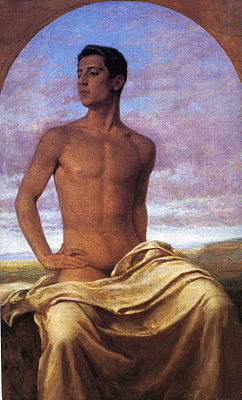Portal:LGBTQ
| Main page | WikiProjects & Things you can do |

|
The LGBTQ+ Portal |

|

|

|
Introduction LGBTQ (also commonly seen as LGBT, LGBT+, LGBTQ+, and LGBTQIA+) is an initialism for lesbian, gay, bisexual, transgender and queer or questioning. It is an umbrella term, broadly referring to all sexualities, romantic orientations, and gender identities which are not heterosexual, heteroromantic, or cisgender. In the 1990s, gay, lesbian, and bisexual activists adopted the term LGB, supplanting narrower terms such as "gay or lesbian". Terminology eventually shifted to LGBT, as transgender people became more accepted within the movement. Around that time, some activists began to reclaim the term queer, seeing it as a more radical and inclusive umbrella term, though others reject it, due to its history as a pejorative. In recognition of this, the 2010s saw the adoption of LGBTQ, and other more inclusive variants. Some versions of the term, such as LGBT+ and LGBTQ+ add a plus sign, to represent additional identities not captured within the acronym. Many further variants exist which add additional identities, such as LGBTQIA+ (for intersex, asexual, aromantic, and agender) and 2SLGBTQ+ (for two-spirit), LGBTQQ (for queer and questioning), or which order the letters differently, as in GLBT and GLBTQ. The collective of all LGBTQ people is often called the LGBTQ community. These labels are not universally agreed upon by everyone that they are intended to include. For example, some intersex people prefer to be included in this grouping, while others do not. Various alternative umbrella terms exist across various cultures, including queer; same gender loving (SGL); and Gender, Sexual and Romantic Minorities (GSRM). (Full article...) Selected article - The Röhm scandal resulted from the public disclosure of Nazi politician Ernst Röhm's homosexuality by anti-Nazis in 1931 and 1932. As a result of the scandal, Röhm became the first known homosexual politician. Röhm was an early member of the Nazi Party and was close to party leader Adolf Hitler. In the late 1920s, he lived in Bolivia where he wrote letters to a friend, Karl-Günther Heimsoth, in which he candidly discussed his sexual orientation. Röhm's double life began to fall apart when he returned to Germany in 1930 and was appointed leader of the Sturmabteilung (SA), the Nazi Party's original paramilitary wing. Although the Social Democratic Party of Germany (SPD) and the Communist Party of Germany supported the repeal of Paragraph 175, the German law criminalizing homosexuality, both parties utilized homophobia to attack their Nazi opponents and inaccurately portrayed the Nazi Party as dominated by homosexuals. Their goal was to prevent or delay the Nazi seizure of power, which ultimately occurred in early 1933. (Full article...) Selected biography -James Robert Baker (October 18, 1947 – November 5, 1997) was an American author of sharply satirical, predominantly gay-themed transgressional fiction. A native Californian, his work is set almost entirely in Southern California. After graduating from UCLA, he began his career as a screenwriter, but became disillusioned and started writing novels instead. Though he garnered fame for his books Fuel-Injected Dreams and Boy Wonder, after the controversy surrounding publication of his novel, Tim and Pete, he faced increasing difficulty having his work published. According to his life partner, this was a contributing factor in his suicide. Baker's work has achieved cult status in the years since his death, and two additional novels have been posthumously published. First-edition copies of his earlier works have become collector's items. His novel Testosterone was adapted to a film of the same name, though it was not a financial success. Two other books have been optioned for films, but they have not been produced. (Full article...) Selected quote -
Current events
Selected image - This 1908 painting by German artist Paul Höcker depicts Nino Cesarini, the Italian lover of Baron Jacques d'Adelswärd-Fersen. Fersen had fled from France after a sex scandal and built a mansion on Capri, Villa Lysis, where he lived together with Cesarini. The two edited a short-lived literary magazine together, Akademos, which was partly a discreet defense of homosexual love. A romanticized account of their relationship is given by Roger Peyrefitte in his 1959 novel L'Exilé de Capri ("The Exile of Capri").
Did you know… -
This month's birthdays
Selected listsRelated portalsFeatured contentThe following articles and lists have been identified as some of the best produced by the Wikipedia community:
TopicsCategoriesAssociated WikimediaThe following Wikimedia Foundation sister projects provide more on this subject:
Discover Wikipedia using portals |























